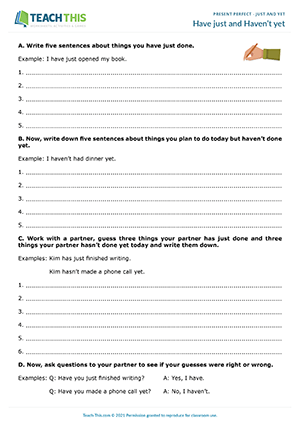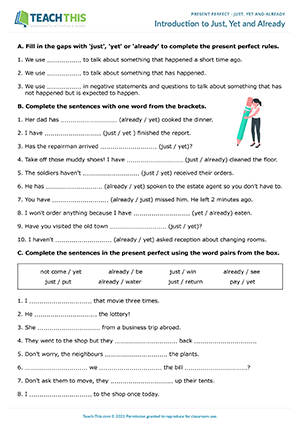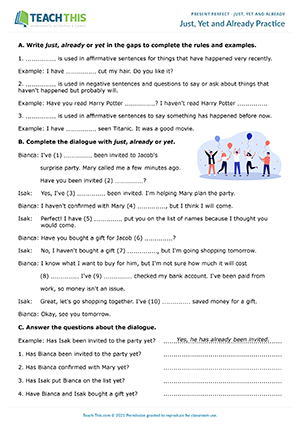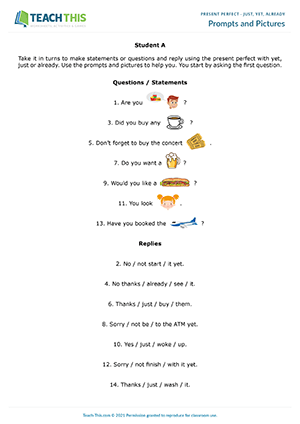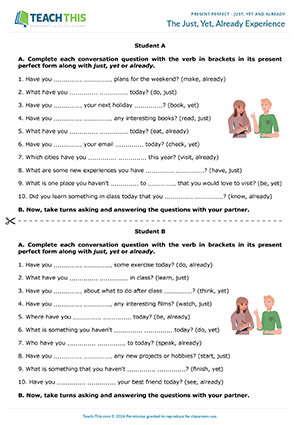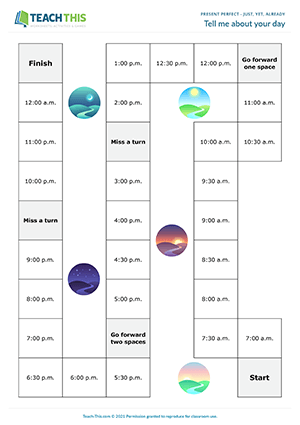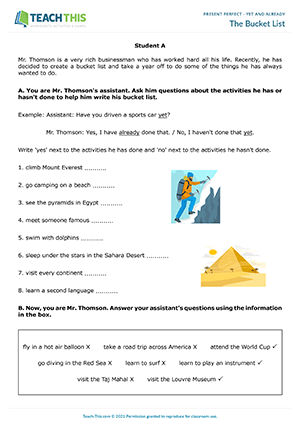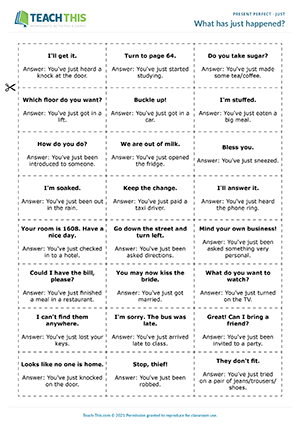This productive present perfect just and yet activity helps students practice making sentences and questions with just and yet. Students start by writing down five sentences about things they have just done and five sentences about things they plan to do today but haven’t done yet. Then, working with a partner, students guess and write down three things their partner has just done and three things their partner hasn’t done yet today. Lastly, students ask and answer questions with their partner to see if their guesses are right or wrong.
This free present perfect worksheet helps students learn and practice the present perfect with just, yet and already. First, students complete present perfect usage rules with just, yet and already. Next, students complete sentences with one word from the brackets. Students then complete sentences in the present perfect using word pairs from a box. Students then move on to rewrite sentences, adding already or yet in the correct place. After that, students complete sentences using the present perfect with just and a verb in brackets. Lastly, students write three true sentences about themselves using the present perfect with just, yet and already.
In this useful present perfect worksheet, students learn and practice how to use just, already and yet. Students begin by writing just, already or yet in gaps to complete grammar rules and examples. Next, students complete a dialogue with just, already and yet. Students then answer present perfect comprehension questions about the dialogue. After that, students complete sentences and questions by choosing the correct words in brackets. Lastly, students write complete present perfect sentences with just, already and yet using a set of prompts.
In this imaginative just, already and yet speaking activity, students make questions and statements and reply using yet, just, and already. In pairs, students take turns making questions or statements from the picture prompts on the worksheet which they direct to their partner. Their partner replies using the present perfect with yet, just, and already from word prompts on their worksheet. Students continue in this way, alternating roles as they go.
This insightful just, yet and already speaking activity helps students practice forming, asking and answering present perfect conversation questions with just, yet and already. First, in two groups, students complete each conversation question with the verb in brackets in its present perfect form along with just, yet or already. Next, students pair up with someone from the other group and take turns asking and answering the conversation questions with their partner, responding in the present perfect with just, yet or already as appropriate. Afterwards, students share what they found out about their partner with the class.
In this fun just, yet and already board game, students make present perfect sentences about what they have normally just done, what they haven’t done yet, and what they have already done at certain times of the day. Students take turns rolling the dice and moving their counter along the board. When a student lands on a time square, they make three sentences with the present perfect. The first sentence is about what they have normally just done at that time of day. The second sentence is about what they haven’t done yet and the third is about what they have already done, e.g. 'At 8 a.m., I have just had breakfast. I haven’t gone to school yet. I have already had a shower.' If a student makes a grammar mistake or if a sentence doesn’t make sense for that time of day, they go back to their previous square. The first student to reach the finish wins the game.
In this free present perfect yet and already activity, students ask and answer questions about someone’s bucket list using yet and already. In pairs, one student takes on the role of Mr. Thomson’s assistant and the other plays the role of Mr. Thomson, a rich businessman. The assistant asks Mr. Thomson questions about the activities he has or hasn’t done to help him write his bucket list. The assistant asks present perfect yes/no questions with yet and marks Mr. Thomson’s answers on the worksheet. Mr. Thomson replies using the present perfect with already for affirmative answers and yet for negative answers. When the students have finished, they swap roles. Finally, students go through the combined items that would be on Mr. Thomson’s bucket list.
In this engaging present perfect with just game, students listen to common everyday expressions and guess what has just happened. In groups, students take turns picking up a card and reading the common expression in bold to the group, e.g. 'I'll get it.' The other students then race to guess what has just happened by making present perfect sentences with You've just... The first student to guess the correct answer wins and keeps the card, e.g. 'You've just heard a knock at the door.' The student with the most cards at the end of the game wins.
Latest Free
Resources
- Everyday Objects Bingo
Everyday Objects
Elementary (A1-A2)
- Action Verb Races
Actions
Elementary (A1-A2)
- Birthday Basics
Birthdays
Elementary (A1-A2)
- Sales Phrasal Verbs
Business Phrasal Verbs
Upper-intermediate (B2)
Latest Member
Resources
- Collocations at Work
Business Collocations
Intermediate (B1)
- Etiquette Trivia Board Game
Etiquette and Manners
Upper-intermediate (B2)
- Everyday Objects Vocabulary
Everyday Objects
Pre-intermediate (A2)
- Let's have a talk
Verb-Noun Collocations
Pre-intermediate (A2)



